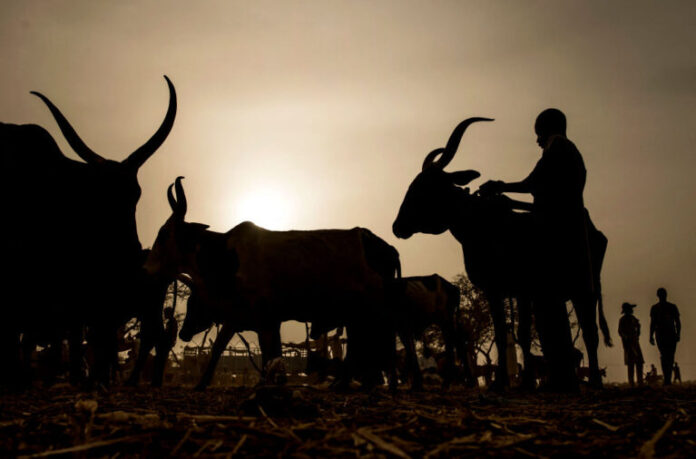By: Abdullahi Inuwa/Zagazola Makama
In many parts of Nigeria, a painful and largely unspoken story continues to unfold — one that rarely makes the headlines, yet defines the lives of thousands. Fulani pastoralists, who for generations have moved across the country with their cattle in search of grazing fields, often find themselves trapped in a cycle of suspicion, hostility, and violence.
To many Nigerians, the image of the Fulani herder has become intertwined with insecurity, criminality, and terrorism — a stereotype that pastoralist communities say is not only unjust but deeply dangerous. Across parts of the North Central and Southern states, Fulani herders increasingly face targeted attacks, killings, and destruction of livestock. Community leaders and pastoralist associations recount stories of cattle — their only means of livelihood — being seized, burned, or slaughtered, often without provocation.
Yet, their suffering rarely attracts public outrage, sympathy, or a serious government response. “We are profiled before we are heard,” lamented a pastoralist leader during a recent community meeting in Kaduna. “When a herder is attacked, it doesn’t trend or matter to anyone. But if a retaliation happens somewhere else, suddenly we become the villains.”
For many Fulani herders, cattle are far more than livestock — they are life itself. Cattle are dowries, school fees, and the savings of an entire generation. They are a symbol of identity, pride, and economic survival. Losing them is equivalent to losing everything.
Despite their nomadic lifestyle, Fulani herders form an integral part of Nigeria’s rural economy, contributing to the nation’s meat and dairy supply. Yet, they live under growing fear. In states like Benue, Plateau, and Taraba, numerous reports have emerged of herders being ambushed along grazing routes, their families displaced, and their livelihoods wiped out.
This cycle of violence and revenge has become self-perpetuating. In some areas, after herders are attacked, reprisal assaults follow from criminal elements — blurring the line between legitimate self-defense and outright banditry. Unfortunately, the media and public discourse often focus only on the latter, leaving the initial victims unheard.
Experts and conflict analysts have long argued that Nigeria’s herder-farmer crisis is rooted in environmental degradation, population growth, and shrinking access to pasture and water. However, ethnic profiling has transformed a socio-economic problem into an identity war.
“The real tragedy,” said a researcher with the Centre for Peace Studies at Ahmadu Bello University, “is that people have stopped distinguishing between armed criminals and peaceful herders. This blanket suspicion isolates the innocent and strengthens extremists.”
The consequences of this prejudice are devastating. When herders are attacked, few investigations follow. Police and security responses are often delayed or indifferent. Pastoralist leaders claim that petitions and reports to authorities go unanswered. In contrast, when herders are accused of attacks, arrests and military responses are swift and forceful — reinforcing perceptions of bias and injustice.
This imbalance, community observers warn, feeds resentment and undermines national unity. “Justice must be fair, and must be seen to be fair,” said a member of the Miyetti Allah Cattle Breeders Association of Nigeria (MACBAN). “Otherwise, grievances will continue to grow, and peace will remain a distant dream.”
The silence surrounding the suffering of Fulani pastoralists also has moral consequences. In Nigeria’s conflict reporting, victims are often categorized by ethnicity, and empathy follows political lines. A tragedy that befalls herders rarely receives the same public sympathy as one that affects settled farmers or urban dwellers.
Security analysts insist that resolving the crisis requires confronting the underlying bias in both policy and perception. They urge the government to strengthen dialogue platforms, disarm criminal groups without ethnic labeling, and implement grazing reserves or ranching systems that respect mobility and modern land use.
Above all, security agencies must act based on evidence, not stereotypes. Criminals exist in every group — but labeling an entire community as violent only deepens division and hinders justice.
The Fulani community, like every other Nigerian group, deserves protection, dignity, and access to justice. The Nigerian Constitution guarantees the right to life and freedom of movement for all citizens, regardless of occupation or ethnicity. Ensuring that those rights are upheld for pastoralists is not charity — it is a constitutional duty.
In the end, the majority of Fulani herders want only one thing: peace. They want to graze their cattle without fear of being hunted, profiled, or killed. They want to raise their children in dignity and coexist with their farming neighbors.
As one elderly herder in Nasarawa put it simply, “We do not own guns. Our wealth is our cows. All we ask for is peace.”
Nigeria’s journey to peace and unity cannot afford selective empathy. Justice must not depend on who the victim is, or where they come from. Every life lost — whether farmer or herder — diminishes the nation’s humanity.
Until the silent suffering of Fulani pastoralists is acknowledged, and their voices truly heard, the wounds of mistrust will continue to fester. And without justice, peace will remain an illusion — a mirage fading with each passing season of conflict.
Abdullahi Inuwa Social Commentator ainuwa303@gmail.com/ Zagazola Makama
— END —




